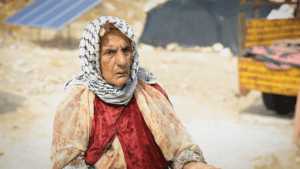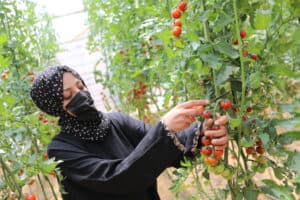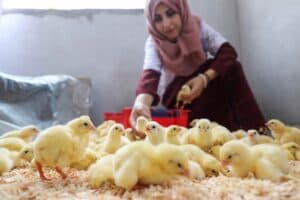Palestinian women deprived of their human rights to land due to occupation and patriarchy
Palestinian women play a key role in agriculture production. Yet they cannot own land, nor can they participate in decisions on land tenure. Their access to land ownership is not only constrained by social and cultural norms, but also by the Israeli occupation, which targets land and natural resources so as to dismantle the Palestinian collective homeland. This strategy is forcing Palestinians into a situation of permanent instability in which their right to food and nutrition cannot be guaranteed. However, Palestinian women continue fighting for their rights as women and as Palestinians. They protest collectively against gender-based violence and occupation; and at the individual level, they struggle every day to set up agri-food enterprises and secure recognition for their rights within the family and the community. In these circumstances, the Tenure Guidelines can provide a holistic framework for conflict resolution in which land rights are bound to the principles of human dignity, non-discrimination, equity, justice, and gender equality.
Palestinian land: a target of Israeli occupation
The Northern part of the Jordan Valley, in the West Bank, is considered the breadbasket of Palestine. The soil is very fertile and, for centuries, Palestinians have made a living from agriculture, pioneering and innovating in food production. Agriculture is a pillar of Palestinian social, economic, and cultural life. However, due to the Israeli occupation, Palestinians are losing their land and, therefore, their source of livelihood as well. In 1980, agriculture production comprised 19% of the Palestinian GDP, but by 2019 that percentage had dropped to 3.5%. Today, more than 30% of the Palestinian population —1.6 million people— cannot access adequate and nutritious food. In the Gaza Strip, food insecurity is even more acute and affects 64.4% of the population.
Palestinian food sovereignty has been undermined by the Israeli occupation and Mufeeda, a Bedouin woman from the herding community of al-Farisiyah in the Jordan Valley, is one of the many Palestinians who have been adversely impacted. She experiences relentless Israeli intrusions onto her land. “Israeli military vehicles stormed the area at night flashing their headlights at us. Then they stepped over our beds and dirtied the bedding. We cannot sleep at night,” explains Mufeeda in this video made by the Union of Agricultural Work Committees (UAWC). She has lived in al-Farisiyah for more than 45 years, but in 2010, the village was completely demolished by Israeli forces, pushing Mufeeda and her family into a situation of permanent instability. Now, Israeli settlements and outposts surround Palestinian compounds where the community lives in shacks and tents without access to electricity or water.
In the Jordan Valley, Israeli forces perform military operations on a daily basis. They have seized 7,518 donums (the Ottoman unit of area equivalent to 1,000 square meters) and have disrupted the geographic continuity of the Palestinian territory through checkpoints and fences. Thus, Mufeeda’s son cannot take his sheep to the mountains and has no other option but to graze them in the courtyard. “Before, when my father was alive, we used to tour these mountains, but now freedom of movement is restricted. Life has become unbearable to us. We are living a life of misery and humiliation,” denounces Mufeeda.
The Israel colonial project deliberately targets the land and space of Palestinians to force the population to move out, thus tearing apart the Palestinian collective homeland. Home destructions facilitate the Israeli expropriation of Palestinian land. Since 2009, Israel has demolished 8,865 structures in the West Bank, of which 30% are agriculture infrastructure and 26% are residential homes, according to data gathered by the United Nations Office for the Coordination of Humanitarian Affairs (OCHA).
In Gaza Strip, the situation is even worse. 75% of the population are refugees or displaced persons and Israel has restricted Palestinians’ access to the area within 300 to 1,000 meters of the fence separating Gaza and Israel, taking 29% of Gaza’s farming land. About 150 female pastoralists can’t access the area anymore to graze their herds, which has impacted their livelihood sustainability already exacerbated by climate change. In 2019, 55% of landowners in Gaza could not reach their land and 74% faced obstacles to working it. Accessing clean water is even harder, as 97% of the existing aquifers are unfit for human consumption.
The Israel colonial project deliberately targets the land and space of Palestinians to force the population to move out, thus tearing apart the Palestinian collective homeland

Mufeeda in her yard where she faces daily the Israeli occupation. / UAWC

